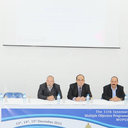[Cardiac side effects of anti-HIV agents].
Atslēgvārdi
Abstrakts
Both nature and prognosis of cardiac complications occurring in patients infected by the Human Immunodeficiency Virus-1 (HIV-1) have changed considerably since the introduction of highly acive and anti-retroviral triple therapy ("HART"). Opportunist cardiac infections have thus been displaced and side effects of drugs now occupy the primary aetiological role. Torsades de pointe may be exceptionally triggered by anti-infectious agents such as pentacarinat or trimethoprime-sulfamethoxazole, as are those induced by the association of ketoconazole and terfenadine or cisapride, the dangers of which are well known and the prevention more effective, especially with the association with HIV antiproteases which inhibit the cytochrome P450. The diagnosis of iatrogenic myocardial dysfunction is more difficult, except when it occurs acutely as with phosphonoformate (Foscarnet), or interleukine-2. Progressive cardiomyopathy caused by -interferon and dideoxynucleosides (zidovudine, didanosine and zalcitabine), reversible on withdrawal of the drug responsible in half the cases, should be distinguished from those due to the HIV itself (therapeutic relay) or to another associated cause (alcohol, coronary artery disease). The coronary complications of diseases treated by antiproteases usually occur in smokers whose cholesterol and triglyceride levels are rapidly increased with HAART. In a series of 9 patients (amongst 700 treated with the antiproteases), after the acute phase of myocardial infarction during which the interventional approach is often preferred, the medium-term prognosis is relatively good, on condition that the patients correct the hyperlipidaemia and give up smoking.


